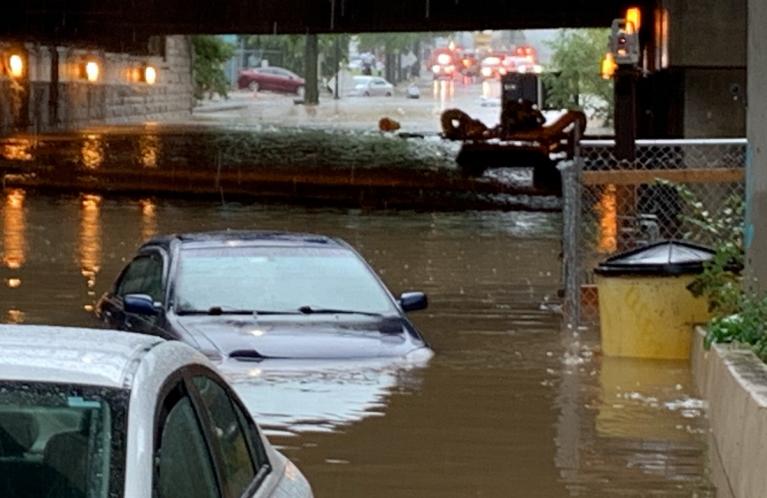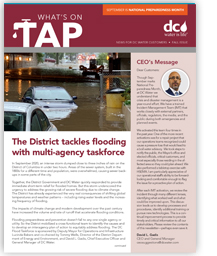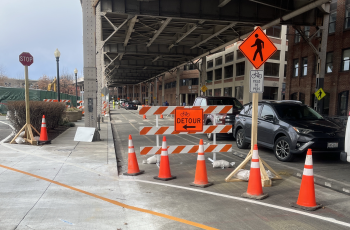
Be Prepared
For details about what we are doing to make the District more flood resilient, and for tips on how you can prepare for floods and other disasters, read our special preparedness issue of What's On Tap.
A Growing Challenge
Like 90-degree days and oppressive humidity, strong summer thunderstorms are part of life in Washington, DC and have been for a long time. But something is changing. Today, the city is experienced the very real consequences of shifting global temperatures and weather patterns – including rising water levels and the increasing frequency of what were once considered once in a lifetime storms. What this means for residents and businesses is a greater risk of flooding, which can lead to costly cleanups and property damage.
It is important for property owners to understand the risks, to take steps to protect their homes and businesses, and to make sure they have adequate insurance coverage.
At the same time, DC Water is working with District agencies and other partners to make the District more flood resilient.
Stormwater Management
DC Water maintains approximately 25,000 storm drains throughout the District. Keeping those drains clear is critical for collecting rainwater and preventing street flooding. If you see a storm drain in need of cleaning or repair, please report it online or by phone at 202-612-3400. Our Command Center is staffed 24-hours, 7-days a week.
Resources for Residents
Backwater valves, also known as backflow prevention devices, are installed on a sewer lateral that connects the building to the public sewer in the street. A properly working backwater valve allows flow to go in only one direction (out), preventing wastewater from entering your building during surcharges of the public sewer system or back-ups caused by storms.
In some cases, DC Water will cover the cost of installing a backwater valve. To see if you might qualify for our Expanded Backwater Valve Program, click here.
Additional Resources
The District Department of Insurance, Securities and Banking (DISB) has insurance tips and other useful information on its website at www.disb.dc.gov. Residents may also contact DISB at floodcomplaints@dc.gov or by calling (202) 442-7828. Below are some links to more information about insurance:
Insurance tips for homeowners and renters
Hidden Benefits of your homeowners insurance policy
It is important to maintain your homeowners insurance
DISB Consumer Guide: Flood insurance
Five reminders about your insurance coverage
After Storm Sandy, five reminders about your insurance coverage
Claims
For information about DC Water's claims process, please visit dcwater.com/claims.
Filled to Capacity
The District of Columbia is one of approximately 700 municipalities in the U.S. with a combined sewer system. That means the sewer system collects everything in one pipe, including sanitary sewage from homes and businesses as well as rainwater runoff. Under normal conditions, the system conveys all of that combined sewage and stormwater to a wastewater treatment plant for treatment, in our case the Blue Plains Advanced Wastewater Treatment Plant. However, during intense storms the amount of wastewater sometimes exceeds the capacity of the sewer system. When this happens, the system is designed to overflow into local waterways.
When the sewers fill to capacity, a storm can also cause overland flooding and backups into homes and businesses, particularly in low-lying neighborhoods in the District.
A Historic Problem
The District inherited a very old system from the federal government and DC Water is working to modernize and expand the sewer and pump station infrastructure every year. The greatest investment is the Clean Rivers Project which is steadily reducing flooding incidents and combined sewer overflows to the Anacostia and Potomac Rivers and Rock Creek. As additional tunnels come on line in 2023 and 2030 there should be even more reduction in overflows and flooding. The First Street Tunnel in Bloomingdale and the lower leg of the Anacostia Tunnel are both in operation and are functioning as overflow storage during heavy rains. For example, the Anacostia tunnel can hold more than 100 million gallons of sewage and stormwater and the First Street tunnel can hold 8 million gallons.
Currently, DC Water is building the Northeast Boundary Tunnel which will add 90 million of additional capacity for combined sewage. The NEBT will help reduce overflows to the Anacostia River and provide additional flooding relief for low-lying neighborhoods. When it is completed in 2023 the tunnel will bring the capacity of the system up to a 15 year storm. Please click on the links for more information about the NEBP and the Clean Rivers Project.
Despite the added capacity of the tunnels, it is important to note that flooding is still possible in very heavy rainstorms and homeowners should consider purchasing flood insurance.
DC Flood Task Force
The Flood Task Force for the District of Columbia was established by the Office of City Administrator (OCA) in September 2021 to identify policies and projects to bolster flood readiness while equitably protecting the District’s residents and economy from the damage that floods can cause. To learn more about the Task Force's work and to read its draft Action Plans, visit dcfloodtaskforce.org.




